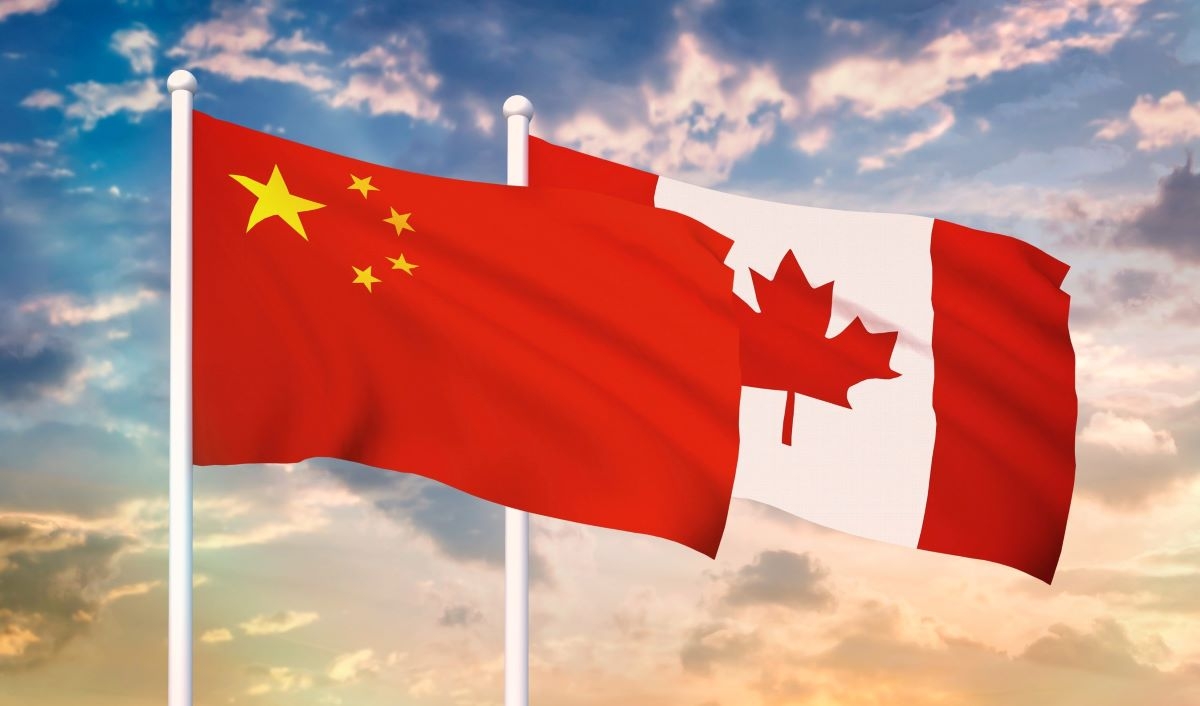
Canada and China: neither seems to get what makes the other tick
Op-ed: Relations between Canada and China are currently rather strained, in part because of the long-running court proceedings over the US request to Canada to extradite Meng Wanzhou, a senior executive of Huawei and the daughter of its founder, to which the response of China was, among other things, to arrest and hold hostage (with a small fig leaf of ersatz legal process) two semi-prominent Canadians who were, at the time, in China. The rest of the response of China has been a few arbitrary unfounded trade restrictions and endless symbolic bloviation.
The wider context, however, is that China has been doing some muscle-flexing, in terms of arms buildup, the extensive use of aid diplomacy in Asia and Africa, and an aggressive enforcement of its unique interpretation of its territorial rights in the South China Sea, carried out in a fashion that departs so far from UNCLOS (the United Nations Convention on the Law of the Sea) that one could imagine that China had never read it, despite the fact that it has signed and ratified that convention.
These actions, and others, have given rise to a narrative amongst the US and its allies that China today is confident and ambitious, and has set a course for itself to become a regional hegemon, a peer competitor, and the most prominent world power. There is a growing literature on the competition and confrontation of the two giants, much of it characterizing it as “a new cold war”, along with plenty of speculation about the risk of real war. Some US analysts have opined that China’s military buildup signals, among other things, a likely attempt to use military force to reintegrate Taiwan into China within six years.
While I assume that this simplistic interpretation of Chinese intent has some elements of truth in it, it seems unlikely to be very predictive, as it flies in the face of some of the eternal verities of the drivers of tensions in the international arena. And one of these verities is that aggressive gesturing in international relations by states that have some ability to project power often derives more from their fears than it does from their ambitions. Furthermore, manoeuvers in the international arena, especially symbolic ones, often owe more to domestic political needs that to actual objectives abroad. (While this article focusses on China, this truism may be even more central to understanding various foreign moves by Putin’s Russia.)
In the case of China, it may well be useful to understand what its greatest fears are, in order to understand, predict, and counter its aggressive gestures. But, on the whole, Canadians reflect little on what scares the daylights out of President Xi and his inner circle of Han autocrats that help him to rule China. In the next section of this article, I will explore four of those existential fears. The first three are very much still in play, while the fourth, as we shall see, has been considerably alleviated by events of the past three decades.
After that, I will explore some aspects of China’s naiveté about how Canada works.
Fear #1: Fracture
Viewing China from afar, as we and most of our allies do, we are inclined to miss the fine structure. We accept at face value the Chinese narrative that China is a single unified nation state, and has been for a very long time. The Han autocrats would like to believe it too, but in their nightmares they do not. They are terrified of ethnic division and possible fracture. They still bemoan the loss of Mongolia, which they only officially acknowledged in 1946. This primal fear of resurgent ethnic differences and regional desires to be relieved, in whole or in part, of the heavy hand of Beijing seems to crop up in all of our intelligence feeds, and all the interviews with military defectors of any prominence. It has been a central driver in the long-standing campaign by China to eradicate or trivialize the Tibetan culture.
The pressure against the Uygurs of Xinjang is another example. Despite being one of China’s 55 recognized ethnic minorities, the Uygurs, who constitute about 43% of the population of Xinjang, are under horrific pressure. Since 2015 roughly 10% of all Uygurs have been detained in internment camps, with the apparent goal of ensuring adherence to the national ideology. The Chinese authorities maintain that it is an attempt to curb terrorism and Islamic extremism, citing at least nine non-trivial incidents in the 25 years from 1990-2015. The extent of the vast Chinese over-reaction underscores Han fears of ethnic division leading to fracture.
Hong Kong is another setting in which even modest autonomy hugely alarmed the Praetorian Guard in Beijing, because if it persisted, others might think they had a chance too. So, Hong Kong is now being so tightly controlled from the centre that political differences will be of a cosmetic nature only.
Which brings us to Taiwan. The People’s Republic of China has had no de-facto control of Taiwan in living memory. The history of Taiwan insisting that it is part of China owes as much to the frustrated ambitions and lurid fictions of the Nationalists under Chiang Kai-shek after 1949 as it does to the history of the People’s Republic. But be that as it may, both China and Taiwan still maintain that Taiwan is (sort of) a part of China, even if separately governed. Thus the “expectation” on the part of China that they will, in due course, be reunited.
There is one school of thought, however, that views China’s increased military posturing vis-à-vis Taiwan not as a precursor of a military assault on Taiwan, but as something else entirely. The analysts of that school are convinced that China really doesn’t want a costly war, even a fairly short one, because it would probably exacerbate existential fear #2 (see below). Rather they see the sabre-rattling, especially in the light of China’s increased capabilities resulting from its military buildup, as a technique to guarantee that Taiwan does not take the risky step of declaring itself to be an independent nation state, even though it functions as one. In short, no declaration of independence, no attack. In recent years, independence-oriented political parties have done well in Taiwan, and China’s great fear is that a declaration of separate nationhood by Taiwan would have a domino effect, triggering fracture movements on the mainland. There have at various times been hints from China that a declaration of complete independence might even justify the use of nuclear weapons against Taiwan.
In the international arena, however, it is always a mistake to be too transparent about one’s nightmares. It gives your opponents a lever. A symbolic act that is someone else’s nightmare is easily weaponized. Should a third party recognize Taiwan as a nation state, or even threaten to do so, without Taiwan declaring itself one, no good could come to China from attacking Taiwan as a response. Such precipitous action would merely impose huge costs upon China and unify China’s opponents. This leaves China uncomfortably vulnerable to being tormented from abroad on this issue.
Fear #2: Economic Catastrophe, Unrest and Revolt
In the light of China’s great economic successes of the past three decades, why would fears of a near-doomsday-like tsunami of economic downturn and social unrest even be conjured up by a neurotic pessimist, let alone by well-entrenched technocratic autocrats? The answers lie in demography and the natural life cycle of totalitarian states.
The leaders of China are rightly proud of the economic advances of recent decades. In fact, they rely on their economic successes for two important things: the acquiescence of the governed and international prestige and influence. But sustaining that economic performance may be tricky, and any failure can be smoothed over for just so long by issuing statistics which are not well anchored in fact.
It has become commonplace to comment that China’s long adherence (recently eased) to a one-child policy would eventually create an age distribution in the nation that would predict future economic catastrophe when a smallish number of working age folk would need to support an enlarged geriatric population. The failure of Japan in this regard, which was the downstream effect of a sustained attempt to limit population growth during the second half of the 20th century, is often cited. The over-65 population of Japan today approaches 30%, and there are four over-65’s for every five 25-54’s.
But to be fair, the age distribution of the population of China is nowhere near as extreme as that of Japan. In fact, it is only modestly different from that of Canada. But danger still lurks, because of two key differences when projecting future ratios of workers to retired in the China/Canada comparison.
The first key difference relates to the invention of the ultrasound machine. When Japan was at its most active in preventing population increase by encouraging abortion, prenatal determination of the sex of the fetus was relatively rare. But by the time China was fully engaged in enforcing its one-child policy, the availability of ultrasound to determine fetal sex was widespread. The preference for male offspring appears to have resulted in widespread sex-selection abortion. Consequently, the skewing of sex ratios at birth was considerably greater in China than in the earlier similar population-control campaigns in Japan. Today in China, for the population under the age of 25, there is a ratio imbalance that represents a shortage of about 30 million women. This does not bode well for future birth rates. The natural sex ratio at birth is slightly tilted towards males anyhow, but the tilt in that ratio in China for the under-25’s is three times what it is in Canada, so it is logical to assume that some exogenous non-biological factor was at play.
Furthermore, official data on fertility in China shows that the average couple produces 1.8 offspring, well under the 2.1 steady-state replacement rate. That being said, many scientists believe that to be a contrived figure, with the real rate being about to 1.5. Admittedly, the Canadian rate is only slightly higher, but there is one further huge adjuster of labour force growth and age distribution in Canada, and that is immigration. In Canada, we typically admit enough immigrants each year to equal about 0.8% of the population, and about 82% of immigrants to Canada are under 40 years of age. This fully counterbalances the fertility deficit. China, on the other hand, has an immigration rate of effectively zero. It grants fewer than 2000 permanent residence permits per year. Consequently, Canada will not be beggared by demography 25 years hence, but China might be.
The fear of a looming truncation of the economic miracle is exacerbated in China by the realization that only increasing prosperity keeps two other factors from inducing unrest. Those two factors are inherent in the governance system, and they are extreme economic disparity and rampant endemic corruption. Absent steadily improving incomes, these features can lead to turmoil. Hence the episodic highly publicized campaigns against corruption, which, to be fair, do suppress a portion of some of the coarsest forms of corruption. But, in totalitarian states, corruption, in the form of undue exercise of influence, and compensation thereof, is inherent. It is the only way to get things done, and, absent any grass roots democratic process to “throw the bums out” at regular intervals, such governing structures eventually age out.
In democratic states, governments also get long in the tooth, and show it in irritating, sometimes trivial, ways that eventually anger the electorate, who then replace them. That, in fact, is the main driver for alternating governments in Canada, where the political spectrum (from a world perspective) is surprisingly narrow, so normally policy doesn’t change very much, just the folk churning it out do.
In China, absent such mechanisms, and given the massive inherent cost of state control of activities and people, any failure of prosperity risks creating unrest of the sort that drives controlling structures towards counter-measures that can inadvertently trigger regime change by internal coup initiated by frustrated reform elements within the power structure. Or worse yet, if the stimulus is sufficient, real revolution can begin, from the far edges of the power structure. In the lexicon of nightmares, what this one lacks in immediacy, it makes up for in frightfulness.
Fear #3: Foreign Interference
The 110 years from 1839 to 1949 were traumatic for China. Weakness of the institutions of the state, internal divisions, conflict, revolts and civil wars, territorial fluidity with some territorial losses, plus pressure from and interference by technologically more advanced Western nations gave China an inexpressibly difficult time, to say nothing of eight years of war with Japan overlapping with an ongoing civil war. While the narrative that China’s long agony was the product of both direct and indirect foreign interference is certainly not the whole story, there is no doubt that the history of China from the first Opium War until the Kuomintang, which had been heavily backed by the US, decamped to Taiwan in 1949 has a profound psychological legacy. And that legacy is the visceral sense amongst the leadership that most problems somehow stem from foreign interference.
Two consequences of this understandable preoccupation remain evident in the stances of China today. The first is a considerable preoccupation with defence of the homeland. A reaction amplified by that preoccupation is explored below in Fear #4.
The second consequence of that legacy is difficulty with the concept of compromise in the international arena. China is quite open to negotiate international agreements of a win-win sort, but any agreement that is a compromise, or partial win only, in order to get the acquiescence of another nation to some arrangement always feels like a return to foreign interference. When this occurs, the US and its allies often read it as China’s arrogance. But in part it is a reflex reaction against historic traumas from an era that ended only 72 years ago.
Fear #4: Weakness due to technology lag
The fourth fear is one which has, at this point, largely been assuaged. It is a fear that blossomed over four days in February of 1991. Prior to that date, China had built a powerful conventional army and air force to defend the homeland, using the best technologies of the 1960’s and 1970’s. It was a large force, well-equipped by the standards of the day, and exercised regularly.
On Feb 24, 1991, an American-led coalition relying mostly on American military assets, launched its coordinated attack against Iraqi forces that had invaded Kuwait (and a bit of Saudi Arabia). The Iraqi forces were extensive, well equipped and well trained, and looked a great deal like the armed forces that China had built. They had been damaged by 42 days of aerial attacks, but it is what happened in the 100 hours starting on Feb 24 that most shocked China.
The American and allied forces used in that assault in 1991 would not be considered especially high tech by today’s standards, but they were very high tech for 1991. When these forces met the very capable old-style army, navy and air force of Iraq, what happened was rather like a science fiction novel about parallel universes. The two forces passed through one another as if they were on different planes. Yes, they actually saw one another from time to time, but the perspectives from the two sides were completely different. When each had finished passing through the other, one was intact and the other had, for all practical purposes, ceased to exist.
It was an epiphany for the rulers of China. The reaction was something like, “Damn, we got it all wrong, and now we’re almost defenceless”. Frantic modernization ensued, enabled in part by a now thirty-year long campaign of espionage (industrial and otherwise) and theft or appropriation of intellectual property. One of the largest irritants still today in China’s relations with the rest of the developed world is its ongoing rather cavalier treatment of intellectual property rights. While some observers persist in attributing a failure to honour such rights to the ideological views of communism with respect to private ownership of property, intellectual or otherwise, I suspect that, now that China has almost closed the tech gap, there may be a few more nods in the direction of international norms in this area.
The Sum of All Fears:
It would be enormously helpful to us to be reminded of these fears when interpreting China’s stance on any given issue. It will help us to avoid the simplistic interpretations that imply that no cooperation is possible. Careful, guarded cooperation is possible, once we have fully internalized that China’s actions derive from a heady mixture of ambition and fear, and not just ambition alone. And we must always be mindful that foreign policy moves, symbolic and otherwise, are always related to domestic politics as well. Such reflections also help us to identify the most powerful levers available to us. For example, in our dealings with China, any admonition we utter about the treatment of regional minorities in China is just another bit of “foreign interference” to be ignored, but threatening to increase the status we ascribe to Taiwan, or actually doing so, that’s near the top of China’s nightmare list.
China’s mistakes in its relations with Canada
If we sometimes fail to understand China, the reverse is also true. The press in Canada has amused itself by pointing out to China that, in Canada, political interference in the court system can easily get you kicked out of office or voted out of office. True enough, but in extradition matters we do have a tradition of ministerial discretion, though it is never exercised until after the courts are done with their work. However, if China is looking for a favourable exercise of ministerial discretion, i.e., deciding not to extradite Meng Wanzhou, in the slightly unlikely event that the US extradition request is upheld by the court late in 2021, China has gone about setting the stage for such a courtesy in the most spectacularly unproductive way. It has sought to slightly bully the Government of Canada into complying with their wish by engaging in hostage diplomacy and heavy-handed trade decisions, as noted in the first paragraph of this article.
Clearly, China missed the course on Canadian Politics 101. News flash: Canada has a minority government. It is a minority government that has just about run as long as a minority government usually can manage, and there will likely be an election later in 2021. Furthermore, it is a minority government of a centrist party that lost any actual driving ideology decades ago, unless adherence to polls counts as an ideology. So, between now and the next election, the key thing that matters to the government is to be popular with Canadians. They need to get that few extra votes a few months hence. Hence, for the coming months, leadership in Canada is going to look a lot like followership. Whatever the mood of the public is perceived to be, that will be the stance of the government, right up to election day. Consequently, if China wanted the Government of Canada to do a particular thing under the present conditions, the only way to ensure that would be to make sure that China is popular with the Canadian people. But right now, the people of Canada are thoroughly irked with China, and becoming more so every day, thanks to poor decisions in Beijing, guaranteeing that our government will be loath to do China any favours. A cleverer tactic for Beijing would be to release the two Michaels (using whatever fig leaf gives them slight cover, like expulsion), and to suddenly find that some of their concerns about Canadian products were unfounded. A few weeks thereafter, Beijing’s favourability rating with the Canadian public would have improved enough to give any Minister of Global Affairs adequate cover, should an exercise of ministerial discretion be useful some time in the Fall, when a decision on the extradition by the court is possible.
Put simply, pissing off Canadians has never been a good way to get them to help you. It’s not in our cultural DNA. Nation states that have land borders with powerful opponents are often accustomed to making some concessions in the face of intimidation. Canada, with a rather large wet spot on either side of it, and a big long-standing ally to the south, has had a long tradition of thinking itself immune to such mafia-like tactics. True, oceans are no longer the protection they once were. But our mindset persists. So, it might work better for China in its relations with us to do what works, instead of what comes naturally.
Photo: iStock








